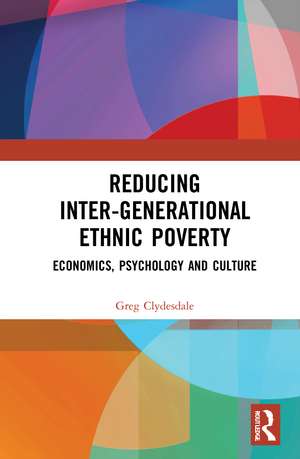Reducing Inter-generational Ethnic Poverty: Economics, Psychology and Culture
Autor Greg Clydesdaleen Limba Engleză Hardback – 30 noi 2020
The book begins by looking at cultures and assimilation and investigates the link between education, culture and socio-economic status. It also attempts to answer the question of what the link between culture, parents and children’s ability is and why ethnic groups vary in their nurturing. It delves into how parenting and cognitive development are interrelated.
This thought-provoking book concludes with an emphasis on nurture and how it may alleviate ethnic poverty and shape social policies. The book provides a strong thesis to counter explanations based on racial and genetic superiority.
| Toate formatele și edițiile | Preț | Express |
|---|---|---|
| Paperback (1) | 362.40 lei 6-8 săpt. | |
| Taylor & Francis – 30 mai 2022 | 362.40 lei 6-8 săpt. | |
| Hardback (1) | 1153.41 lei 6-8 săpt. | |
| Taylor & Francis – 30 noi 2020 | 1153.41 lei 6-8 săpt. |
Preț: 1153.41 lei
Preț vechi: 1214.12 lei
-5% Nou
Puncte Express: 1730
Preț estimativ în valută:
220.71€ • 236.01$ • 184.02£
220.71€ • 236.01$ • 184.02£
Carte tipărită la comandă
Livrare economică 18 aprilie-02 mai
Preluare comenzi: 021 569.72.76
Specificații
ISBN-13: 9780367616298
ISBN-10: 0367616297
Pagini: 128
Ilustrații: 2 Tables, black and white; 4 Illustrations, black and white
Dimensiuni: 156 x 234 x 13 mm
Greutate: 0.32 kg
Ediția:1
Editura: Taylor & Francis
Colecția Routledge
Locul publicării:Oxford, United Kingdom
ISBN-10: 0367616297
Pagini: 128
Ilustrații: 2 Tables, black and white; 4 Illustrations, black and white
Dimensiuni: 156 x 234 x 13 mm
Greutate: 0.32 kg
Ediția:1
Editura: Taylor & Francis
Colecția Routledge
Locul publicării:Oxford, United Kingdom
Public țintă
PostgraduateCuprins
1.Introduction 2. Assimilation, Cultural Superiority and Poverty 3. What is the link between Culture and Economic Systems? 4. What is the link between Culture, Parenting and Children’s ability? 5. Culture, Socio-economic Status and Educational Outcomes 6. Neuroscience and Ethnotheories 7. Human Capital, Cognitive Skills and Cultural Change 8. Blurred Lines: Socio-economic Status and Ethnicity 9. What are the Implications for Policy? 10. Two Case Studies 11. Poverty vs Welfare 12. Do We Really Want to Solve This?
Notă biografică
Greg Clydesdale lectures at Lincoln University, New Zealand. His expertise centres on economic growth and welfare on which he has authored four books. He has conducted staff training and consultancy programmes for public and private organizations including the Ngai Tahu Development Corporation (a Maori tribe).
Recenzii
"The book will be useful for scholars with a pre-existing understanding of the explanations of poverty, development, and welfare by providing them with opportunities reflect on their beliefs on poverty reduction and consider the possibility of culture and parenting as a solution for narrowing the gap between disadvantaged ethnic groups and the mainstream groups." -Mengxing Ma, The University of Sheffield, UK.
‘This book examines inter-generational ethnic poverty from the perspective of human capital development. Drawing on a large amount of literature from different disciplines, for example, economy, anthropology, developmental and educational psychology, Clydesdale argues the important impacts of culture on material wealth creation by discussing the link between culture and economic systems, and the link between between culture, parenting, and children’s ability. …
Ultimately, this book provides a theoretical discussion about the influence of culture on parenting and material wealth creation. With caution, practitioners and policymakers may consider its suggestion on the provision of parental programs as a solution to inter-generational poverty reduction. The book will be useful for scholars with a pre-existing understanding of the explanations of poverty, development, and welfare by providing them with opportunities reflect on their beliefs on poverty reduction and consider the possibility of culture and parenting as a solution for narrowing the gap between disadvantaged ethnic groups and the mainstream groups. However, it may not be suitable for lay audiences or students who are new to this field because it presents a narrow understanding of poverty that is attributed to cultural characteristics.’
M. Ma (2021) Book Review of the Book Reducing Inter-generational Ethnic Poverty: Economics, Psychology and Culture by Greg Clydesdale for Progress in Development Studies
‘This book examines inter-generational ethnic poverty from the perspective of human capital development. Drawing on a large amount of literature from different disciplines, for example, economy, anthropology, developmental and educational psychology, Clydesdale argues the important impacts of culture on material wealth creation by discussing the link between culture and economic systems, and the link between between culture, parenting, and children’s ability. …
Ultimately, this book provides a theoretical discussion about the influence of culture on parenting and material wealth creation. With caution, practitioners and policymakers may consider its suggestion on the provision of parental programs as a solution to inter-generational poverty reduction. The book will be useful for scholars with a pre-existing understanding of the explanations of poverty, development, and welfare by providing them with opportunities reflect on their beliefs on poverty reduction and consider the possibility of culture and parenting as a solution for narrowing the gap between disadvantaged ethnic groups and the mainstream groups. However, it may not be suitable for lay audiences or students who are new to this field because it presents a narrow understanding of poverty that is attributed to cultural characteristics.’
M. Ma (2021) Book Review of the Book Reducing Inter-generational Ethnic Poverty: Economics, Psychology and Culture by Greg Clydesdale for Progress in Development Studies
Descriere
This book looks at human capital development and provides explanation for why cognitive development varies among ethnic groups. The book provides a strong thesis to counter explanations based on racial and genetic superiority.
